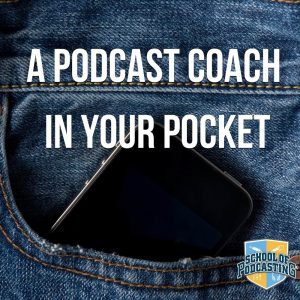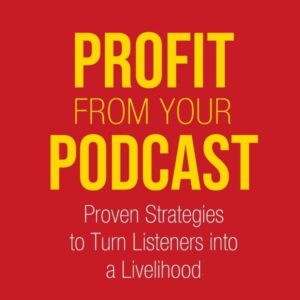
Today's episode is somewhat visual as I discuss how much media hosting you need. Do you need Media hosting? YES. Watch the video to see how to calculate how much hosting you need.
Some people like hosts like Buzzsprout, RSS.com as you have a set monthly pricing, but you need to know how much you will be uploading each month. This helps you figure out your budget for starting your podcast. Other media hosts like Captivate (which is who I use) and Transistor, don't limit how much you can upload, or the number of shows, and episodes (your bill only goes up if you get really popular).
Here are the numbers I use for this:
64 kbps .53M/minute (AM Radio Quality)
96 kbps .77M/minute (FM Radio Quality)
128 kbps = 1M/minute (CD Quality)
The numbers are based on recording a one-minute podcast and exporting the audio using those settings. They may not be exact (based on your software), so use them as a reference.
If I do a 20-minute podcast at CD quality, multiply the number of minutes by the factor for that publishing rate.
20 minutes at AM radio quality is 20 X.53 so your file will be approximately 10.6 M
20 minutes at FM radio quality is 20 X.77 so your file will be approximately 15.4 M
20 minutes at CD quality is 20 X 1 so your file will be approximately 20 Megs
If you do one show a week, that is four episodes a month or
1 Episode = 20M = 80 Megs of storage needed per month.
A fifteen-minute podcast at FM radio quality would be:
15 Minutes X .77 = 11.6 Megabytes per episode.
11.6 Megs per episode X 4 Episodes a month = 46.4 Megabytes of Storage needed a month.
The two hosting companies I recommend are Libsyn.com and Bluburry.com
Why I'm Not A Fan of Blog Talk Radio
When you record your voice, you typically set your software to “take a picture” of your voice 44,000 times a second. This is called the sample rate. Blog Talk Radio uses a sample rate of 11,025. This is 1/4 of the quality. We mention in this episode that, in my opinion, 64Kbps is AM radio quality (which hardly any podcasters use). Blog Talk Radio publishes at 32kbps; this is HALF the quality of an AM Radio. I did see in their forums that they may plan to offer higher publishing rates that would offer better quality.
I do like their phone interface, but their website has a TON of advertising; when people download your podcast, there is an advertisement inserted at the beginning. When you go to listen to a podcast on their website, you have to sit through a video advertisement before the show starts.
When I watched their tutorial on promoting your podcast, they mentioned Twitter and Facebook (which you don't need blog talk radio to use). They do place an advertisement on their website about your podcast (5000 impressions) when you have the “Pro Account” (which is $39.99 a month). For me you could use a free phone interface to take live calls and achieve the same thing. You would:
1. have to have a set time to record your show so people knew when to visit your site to listen.
2. You could use a free service like mixlr.com to stream the audio live.
3. You could use something like Free Conference Calling.com to have people dial in, and mix that audio out of your computer into your mixer (that has your microphone plugged into it), and mute and un mute people to be on the show.
4. Use Twitter and Facebook to promote your show.
5. Take the Recording off of your portable recorder (Like a Roland R-05) and add intro and outro music (or plug your iPod into the mixer and use it to trigger music).
Things Mentioned on the Show
Justin at http://www.justinbvocal.com/ (out of business)





Hi Dave,
thanks for the new episode! I just wanted to comment on the bitrate-discussion in your show notes. Personally, I do not mind 64bit podcasts if they are otherwise well produced. In my opinion they do not necessarily sound like AM radio. But that is personal opinion, of course.
But where I think you are really wrong is when you say that hardly any podcasters use 64bit compression. Leo Laporte’s “This Week in Tech” is in 64bit, and I believe most (all?) podcasts on the TWIT network are. I also like to listen to “Tech Nation”, which is podcasted by the IT Conversations Network, which, again, broadcasts most (all?) their files in 64bit.
As more and more people are listening to podcasts on their mobile phones, I could imagine that file size (and thus bitrate) becomes an issue, again. Connections are not always good and waiting five minutes to download just a single podcast is not fun. So keeping bitrates as low as acceptable could be a competitive advantage in the world of podcasting.
Well, just my thoughts on this topic…
Thanks for the good show and keep up the great work!
Uwe.
Hi Dave,
in my comment here, yesterday, I made a mistake by talking about 64 “bit” compression. It should have been 64 “kbps”, of course…
Regards
Uwe.
Uwe,
Thanks for the heads up. I guess I’m the one guy on the planet who isn’t an avid Leo lover. I loved him on TV, but his podcasts are a bit too long for me, and his whole “Podcasting is Dead” link baiting that he does every year disappoints me.
Hi Dave
This episode FRIED my brain at first. I was listening to it on the train and couldn’t wait to get home and work out my requirements. This is pure gold, better to work out the calculations first rather than melt down the server ( I wish!) or disappoint my listeners.
Thanks mate your podcasts are great!
Bettina
I believe the 64/96/128 conversation needs one more bit of critical information: How many tracks are in the recording. That’s because the kilobits are spread across however many tracks you have. A 128kbps mp3 stereo recording is two 64kbps tracks. A 128kbps single track mono recording is one track at 128kbps.
(Now, there is something called VBR or variable bit rate where one track can “steal” some of the bits from the other track when its audio content is more complex than that of the other. Complex audio needs more bits to sound good. In VBR, the more complex track gets more bits but the total is still the same, 128kbps or whatever. But leave that aside.)
Leo’s 64kbps podcasts are one mono track. Your 128kbps stereo mp3 is two 64kbps tracks. That’s why Leo’s sounds about the same as yours. In both cases, all the tracks are 64kbps. You just have twice as much audio so you need twice as many TOTAL bits to yield the same sound quality.
You have to be careful with this. There are mono recordings that are only one track and “mono” recordings that are two tracks (R and L) with exactly the same content. A one-track 64kbps mono mp3 sounds the same as a two-track 128kbps mono mp3.
Also, the compression terminology varies by software program. If you set iTunes to compress your wav file into a 128kbps mp3, and your wav is single track mono, you get a 64kbps mp3. If you feed it a stereo wav, you get a 128kbps stereo mp3. Audacity with LAME, in this example, would give you a 128kbps single track mono mp3 in the first case and a 128kbps stereo file in the second.
Confused?
Bottom line: 64kbps single track mono = 128kbps two track stereo.
I have one podcast that is shorter and has some music so I compress to 128kbps stereo. The other is very long with a higher percentage of spoken word and stereo imaging is not really important, so I compress that to a single channel mono mp3 at 64kbps.
All this is my understanding after doing a lot of research about a year ago. I don’t claim to have a perfect understanding of this, and welcome corrections by more knowledgeable people, but I’m pretty certain this is correct.
Max,
Awesome I’ll have to play with this. I think Daniel Lewis tried to explain this to me a while a go and I didn’t quite get it.
Dave
Thank you Dave for just being you. I am retired for a second time , but PODCASTING will be my next step. I have always called talk radio stations, so now I can say what i want and have the time I want. The audiences loved my common sense way of expressing myself, but some host (s)
would get jealous of my popularity, and would cut me off,make a nasty comment, and not let me back. They wanted yes people, and not honest people. You are honest Dave, and I know you will have me up and running. You have an excellent track record.
Judi
Thank you for the great explanation! To a novice, this really helps. 🙂